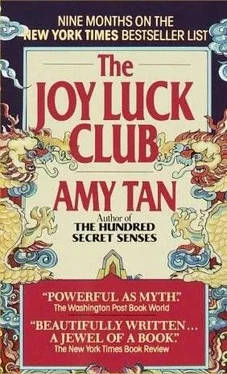I hear more choruses of "Tell them, tell them" as each Auntie frantically tries to think what should be passed on.
"Her kindness."
"Her smartness."
"Her dutiful nature to family."
"Her hopes, things that matter to her."
"The excellent dishes she cooked."
"Imagine, a daughter not knowing her own mother!"
And then it occurs to me. They are frightened. In me, they see their own daughters, just as ignorant, just as unmindful of all the truths and hopes they have brought to America. They see daughters who grow impatient when their mothers talk in Chinese, who think they are stupid when they explain things in fractured English. They see that joy and luck do not mean the same to their daughters, that to these closed American-born minds "joy luck" is not a word, it does not exist. They see daughters who will bear grandchildren born without any connecting hope passed from generation to generation.
"I will tell them everything," I say simply, and the aunties look at me with doubtful faces.
"I will remember everything about her and tell them," I say more firmly. And gradually, one by one, they smile and pat my hand. They still look troubled, as if something were out of balance. But they also look hopeful that what I say will become true. What more can they ask? What more can I promise?
They go back to eating their soft boiled peanuts, saying stories among themselves. They are young girls again, dreaming of good times in the past and good times yet to come. A brother from Ningbo who makes his sister cry with joy when he returns nine thousand dollars plus interest. A youngest son whose stereo and TV repair business is so good he sends leftovers to China. A daughter whose babies are able to swim like fish in a fancy pool in Woodside. Such good stories. The best. They are the lucky ones.
And I am sitting at my mother's place at the mah jong table, on the East, where things begin.
An-Mei Hsu
When I was a young girl in China, my grandmother told me my mother was a ghost. This did not mean my mother was dead. In those days, a ghost was anything we were forbidden to talk about. So I knew Popo wanted me to forget my mother on purpose, and this is how I came to remember nothing of her. The life that I knew began in the large house in Ningpo with the cold hallways and tall stairs. This was my uncle and auntie's family house, where I lived with Popo and my little brother.
But I often heard stories of a ghost who tried to take children away, especially strong-willed little girls who were disobedient. Many times Popo said aloud to all who could hear that my brother and I had fallen out of the bowels of a stupid goose, two eggs that nobody wanted, not even good enough to crack over rice porridge. She said this so that the ghosts would not steal us away. So you see, to Popo we were also very precious.
All my life, Popo scared me. I became even more scared when she grew sick. This was in 1923, when I was nine years old. Popo had swollen up like an overripe squash, so full her flesh had gone soft and rotten with a bad smell. She would call me into her room with the terrible stink and tell me stories. "An-mei," she said, calling me by my school name. "Listen carefully." She told me stories I could not understand.
One was about a greedy girl whose belly grew fatter and fatter. This girl poisoned herself after refusing to say whose child she carried. When the monks cut open her body, they found inside a large white winter melon.
"If you are greedy, what is inside you is what makes you always hungry," said Popo.
Another time, Popo told me about a girl who refused to listen to her elders. One day this bad girl shook her head so vigorously to refuse her auntie's simple request that a little white ball fell from her ear and out poured all her brains, as clear as chicken broth.
"Your own thoughts are so busy swimming inside that everything else gets pushed out," Popo told me.
Right before Popo became so sick she could no longer speak, she pulled me close and talked to me about my mother. "Never say her name," she warned. "To say her name is to spit on your father's grave."
The only father I knew was a big painting that hung in the main hall. He was a large, unsmiling man, unhappy to be so still on the wall. His restless eyes followed me around the house. Even from my room at the end of the hall, I could see my father's watching eyes. Popo said he watched me for any signs of disrespect. So sometimes, when I had thrown pebbles at other children at school, or had lost a book through carelessness, I would quickly walk by my father with a know-nothing look and hide in a corner of my room where he could not see my face.
I felt our house was so unhappy, but my little brother did not seem to think so. He rode his bicycle through the courtyard, chasing chickens and other children, laughing over which ones shrieked the loudest. Inside the quiet house, he jumped up and down on Uncle and Auntie's best feather sofas when they were away visiting village friends.
But even my brother's happiness went away. One hot summer day when Popo was already very sick, we stood outside watching a village funeral procession marching by our courtyard. Just as it passed our gate, the heavy framed picture of the dead man toppled from its stand and fell to the dusty ground. An old lady screamed and fainted. My brother laughed and Auntie slapped him.
My auntie, who had a very bad temper with children, told him he had no shou , no respect for ancestors or family, just like our mother. Auntie had a tongue like hungry scissors eating silk cloth. So when my brother gave her a sour look, Auntie said our mother was so thoughtless she had fled north in a big hurry, without taking the dowry furniture from her marriage to my father, without bringing her ten pairs of silver chopsticks, without paying respect to my father's grave and those of our ancestors. When my brother accused Auntie of frightening our mother away, Auntie shouted that our mother had married a man named Wu Tsing who already had a wife, two concubines, and other bad children.
And when my brother shouted that Auntie was a talking chicken without a head, she pushed my brother against the gate and spat on his face.
"You throw strong words at me, but you are nothing," Auntie said. "You are the son of a mother who has so little respect she has become ni , a traitor to our ancestors. She is so beneath others that even the devil must look down to see her."
That is when I began to understand the stories Popo taught me, the lessons I had to learn for my mother. "When you lose your face, An-mei," Popo often said, "it is like dropping your necklace down a well. The only way you can get it back is to fall in after it."
Now I could imagine my mother, a thoughtless woman who laughed and shook her head, who dipped her chopsticks many times to eat another piece of sweet fruit, happy to be free of Popo, her unhappy husband on the wall, and her two disobedient children. I felt unlucky that she was my mother and unlucky that she had left us. These were the thoughts I had while hiding in the corner of my room where my father could not watch me.
I was sitting at the top of the stairs when she arrived. I knew it was my mother even though I had seen her in all my memory. She stood just inside the doorway so that her face became a dark shadow. She was much taller than my auntie, almost as tall as my uncle. She looked strange, too, like the missionary ladies at our school who were insolent and bossy in their too-tall shoes, foreign clothes, and short hair.
My auntie quickly looked away and did not call her by name or offer her tea. An old servant hurried away with a displeased look. I tried to keep very still, but my heart felt like crickets scratching to get out of a cage. My mother must have heard, because she looked up. And when she did, I saw my own face looking back at me. Eyes that stayed wide open and saw too much.
Читать дальше












